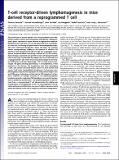T-cell receptor-driven lymphomagenesis in mice derived from a reprogrammed T cell
Author(s)
Serwold, T.; Hochedlinger, K.; Swindle, J.; Hedgpeth, J.; Weissman, I. L.; Jaenisch, Rudolf; ... Show more Show less
Download18939.full.pdf (833.4Kb)
PUBLISHER_POLICY
Publisher Policy
Article is made available in accordance with the publisher's policy and may be subject to US copyright law. Please refer to the publisher's site for terms of use.
Terms of use
Metadata
Show full item recordAbstract
The conversion of mature somatic cells into pluripotent stem cells, both by nuclear transfer and transduction with specific “reprogramming” genes, represents a major advance in regenerative medicine. Pluripotent stem cell lines can now be generated from an individual's own cells, facilitating the generation of immunologically acceptable stem cell-based therapeutics. Many cell types can undergo nuclear reprogramming, leading to the question of whether the identity of the reprogrammed cell of origin has a biological consequence. Peripheral blood, containing a mixture of T, B, NK, and myeloid cell types, represents one potential source of reprogrammable cells. In this study, we describe the unique case of mice derived from a reprogrammed T cell. These mice have prerearranged T-cell receptor (TCR) genes in all cells. Surprisingly, ≈50% of mice with prerearranged TCR genes develop spontaneous T cell lymphomas, which originate in the thymus. The lymphomas arise from developing T cells, and contain activated Notch1, similar to most human and mouse T-cell acute lymphoblastic lymphomas. Furthermore, lymphomagenesis requires the expression of both prerearranged TCRα and TCRβ genes, indicating a critical role for TCR signaling. Furthermore, inhibitors of multiple branches of TCR signaling suppress lymphoma growth, implicating TCR signaling as an essential component in lymphoma proliferation. The lymphomagenesis in mice derived from a reprogrammed T cell demonstrates the deleterious consequences of misregulation of the TCR rearrangement and signaling pathways and illustrates one case of cellular reprogramming where the identity of the cell of origin has profound consequences. Keywords: induced pluripotent stem cells; lymphoma; notch; receptor-mediated leukemogenesis; T cell receptor
Date issued
2010-11Department
Massachusetts Institute of Technology. Department of BiologyJournal
Proceedings of the National Academy of Sciences
Publisher
National Academy of Sciences (U.S.)
Citation
Serwold, T. et al. “T-Cell Receptor-Driven Lymphomagenesis in Mice Derived from a Reprogrammed T Cell.” Proceedings of the National Academy of Sciences 107, 44 (October 2010): 18939–18943 © 2010 The Authors
Version: Final published version
ISSN
0027-8424
1091-6490